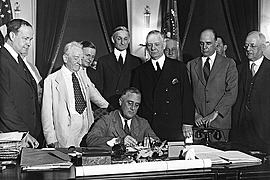
Glass-Steagall Act
The Glass-Steagall Act is a 1933 law that gave power to the Federal Reserve to regulate retail banks. The Act separated investment banking from retail banking. By doing this, retail banks were prohibited from using depositors' funds for risky investments. It prohibited bank officials from borrowing excessively from their own bank. The Act created the Federal Deposit Insurance Corporation, allowing the Fed to better implement monetary policy.